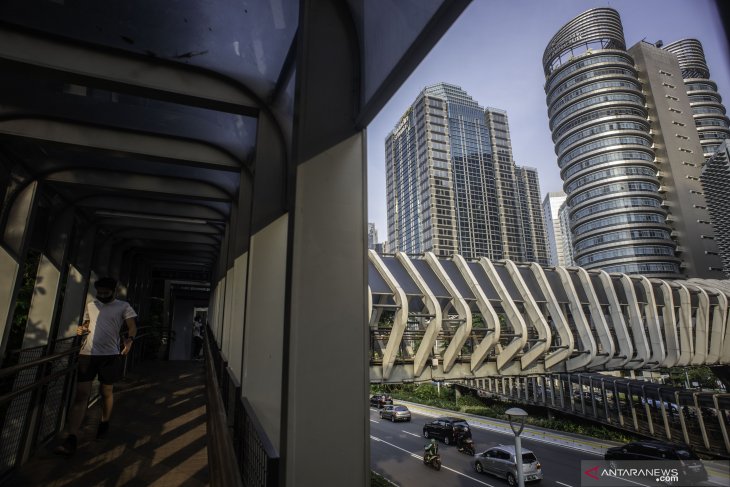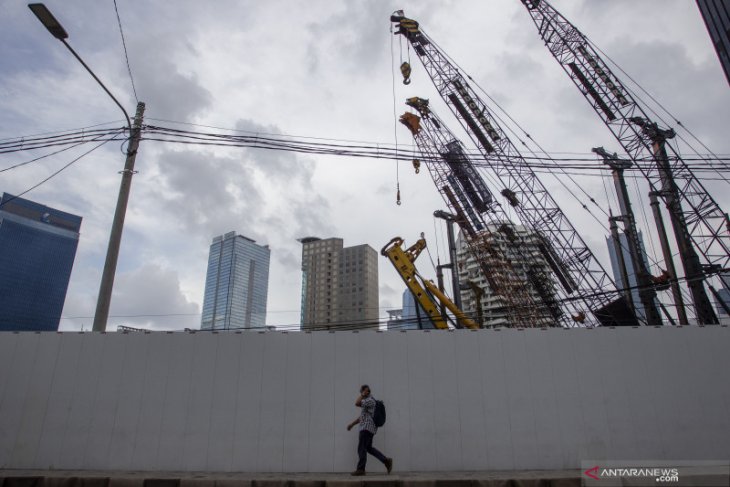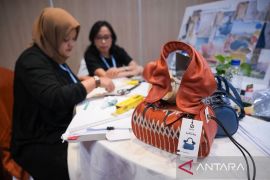Thus, Indonesia officially fell into recession akin to that experienced by various countries battered by the COVID-19 pandemic since it had recorded negative growth for two consecutive quarters, BPS Head Suhariyanto stated at a press conference here on Thursday.
The BPS had earlier also highlighted that the Indonesian economy contracted 5.32 percent yoy in the second quarter of 2020 owing to the COVID-19 pandemic having impeded economic activities.
Despite experiencing negative growth, on a quarterly basis (qtq), Indonesia’s economy advanced 5.05 percent qtq in Q3 of 2020, which shows signs of significant recovery.
Speaking in connection with Indonesia's economic growth in the third quarter of 2020, recorded at -3.49 percent on an annual basis yoy, main expert of Deputy III at KSP Edy Priyono stated that the Indonesian economy had surpassed its lowest point and currently begun showing signs of recovery.
Main expert of Deputy III at KSP Edy Priyono made the statement in Jakarta, Thursday, while speaking in connection with Indonesia's economic growth in the third quarter of 2020 recorded at -3.49 percent on an annual basis (yoy).
Priyono noted that despite negative growth in the third quarter of 2020, when a quarter-to-quarter (qtq) comparison was made, the economy grew by 5.05 percent.
Meanwhile, cumulatively, Indonesia's economic growth during the first to third quarters of 2020 had contracted by 2.03 percent as compared to the corresponding period in 2019.
"Thus, there will be a significant economic improvement, and this can be a good capital to move into the fourth quarter of 2020," Priyono remarked.
Annual economic growth (yoy) in the third quarter of 2020 as compared to the second quarter of 2020 also showed an improvement owing to the smaller level of contraction. In the second quarter of 2020, the annual economic contraction had reached -5.3 percent.
Priyono noted that the current vital aspect is a means to ensure that further policies can be effective to restore the economy.
"The government's strategy to design several programs in the National Economic Recovery (PEN) Program is the right step forward. In addition, it continues to encourage government spending," he remarked.
This is in accordance with the counter-cyclical policy to fight the economic slowdown. He explained that when the economy is sluggish, government spending can become a mainstay to boost the economy, so that it can reverse the cycle of economic slowdown.
Priyono noted that the counter-cyclical policy should continue to be applied till full economic recovery is realized.
In addition, he called to encourage the upper-middle class group to boost consumption.
"So far, it is suspected that they have put a lot of their money into savings. The government needs to support it by enforcing the rules on health protocols since the upper-middle class group will only want to go out and shop (physically) if it feels safe,” he explained.
Priyono stated that the government had, until now, remained consistent in handling the impact of COVID-19 through various measures.
The first area of focus was health by controlling the spread of COVID-19, increasing the cure rate, and reducing the death rate. The second aspect was prioritizing social protection by maintaining the people's purchasing power, while the third aspect was maintaining the economic and financial sectors to the utmost extent, so that the business world can continue to recover.

Better economic growth
During the COVID-19 pandemic, Priyono pointed out that Indonesia's economic growth was also better than several other countries.
Based on the BPS data, countries whose economic growth in the third quarter of 2020 was better than Indonesia comprised China, at 4.9 percent; Taiwan, 3.3 percent; and Vietnam, 2.62 percent.
South Korea and the United States were also slightly better than Indonesia, although the 2020 third-quarter growth of the two countries was also still negative, at -1.3 percent and -2.9 percent, respectively.
However, several other countries experienced a deeper contraction than Indonesia in the third quarter of 2020, including Singapore at -7 percent, and Mexico, -8.58 percent.
"If you look at this comparison, Indonesia's growth is quite good. The most important aspect is that our growth in the third quarter of 2020 was better than that recorded in the second quarter of 2020, thereby indicating that we are gradually moving towards economic recovery," he affirmed.
Fiscal stimulus
Finance Minister Sri Mulyani Indrawati remarked that fiscal stimulus had aided in improving the economic growth figure to minus 3.49 percent in the third quarter, better than the growth of minus 5.32 percent recorded in the second quarter.
“The improvement in economic performance is driven by the role of fiscal stimulus or the role of the state budget instrument in handling the COVID-19 pandemic and the national economic recovery program,” she stated at an online press conference in Jakarta on Thursday.
Indrawati noted that improved growth in the third quarter compared to the previous quarter indicated a process of economic recovery and a reversal of direction of national economic activity to the positive zone.
"All components of economic growth, both from the expenditure side and the production side, have increased," she noted.
The impetus for fiscal stimulus can be seen from the accelerated absorption of state spending of 15.5 percent in the third quarter, bolstered by the realization of social assistance and support for the business world, especially small and medium enterprises, she explained.
“The release of BPS (data) also confirms that the acceleration of realization of state spending, which has increased very rapidly, helped to reverse the growth in government consumption, which grew by 9.8 percent (yoy),” she stated.

“Hence, the increase, from minus 6.9 percent jumping to a positive growth of 9.8 percent, or exceeded 17 percent, was a turning point," she expounded.
The minister stated that government spending on social protection had risen sharply, as was apparent from the improving trend in household consumption in the third quarter, from -5.5 percent to -4 percent.
On the other hand, household consumption of the upper middle class has remained limited due to uncertainty over COVID-19 and its progression, and middle- to upper-class household consumption was dominated by goods and services that are sensitive to mobility, she pointed out.
"With the existence of COVID-19, where mobility has been limited, the consumption of the upper middle class has also been restrained," she stated.
Hence, the minister believes that the government's efforts towards improving the handling of COVID-19 through several indicators as well as the discovery and administration of vaccines was expected to restore the trend of household consumption, especially among those belonging to the upper middle class.
“Hence, improvements are expected and believed to occur in the fourth quarter and beyond," she remarked.
EDITED BY INE
Related news: Indonesia's economic recovery efforts are on right track: official
Related news: Lowest point of economic crisis passed and recovery begun: KSP
Editor: Fardah Assegaf
Copyright © ANTARA 2020












